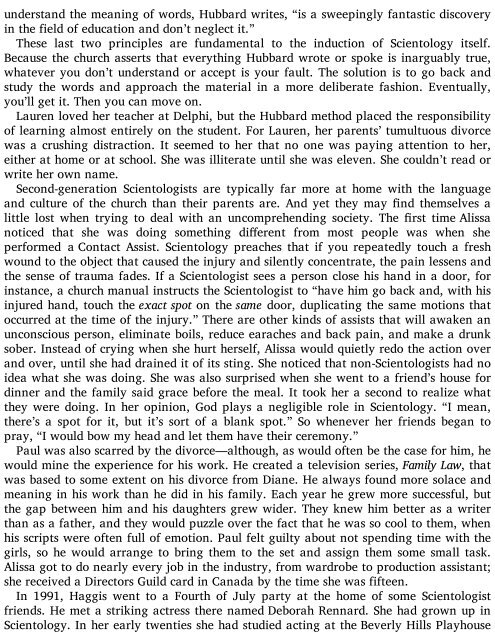going-clear-scientology-hollywood-and-the-prison-of-belief-by-lawrence-wright-2
going-clear-scientology-hollywood-and-the-prison-of-belief-by-lawrence-wright-2
going-clear-scientology-hollywood-and-the-prison-of-belief-by-lawrence-wright-2
Create successful ePaper yourself
Turn your PDF publications into a flip-book with our unique Google optimized e-Paper software.
underst<strong>and</strong> <strong>the</strong> meaning <strong>of</strong> words, Hubbard writes, “is a sweepingly fantastic discovery<br />
in <strong>the</strong> field <strong>of</strong> education <strong>and</strong> don’t neglect it.”<br />
These last two principles are fundamental to <strong>the</strong> induction <strong>of</strong> Scientology itself.<br />
Because <strong>the</strong> church asserts that everything Hubbard wrote or spoke is inarguably true,<br />
whatever you don’t underst<strong>and</strong> or accept is your fault. The solution is to go back <strong>and</strong><br />
study <strong>the</strong> words <strong>and</strong> approach <strong>the</strong> material in a more deliberate fashion. Eventually,<br />
you’ll get it. Then you can move on.<br />
Lauren loved her teacher at Delphi, but <strong>the</strong> Hubbard method placed <strong>the</strong> responsibility<br />
<strong>of</strong> learning almost entirely on <strong>the</strong> student. For Lauren, her parents’ tumultuous divorce<br />
was a crushing distraction. It seemed to her that no one was paying attention to her,<br />
ei<strong>the</strong>r at home or at school. She was illiterate until she was eleven. She couldn’t read or<br />
write her own name.<br />
Second-generation Scientologists are typically far more at home with <strong>the</strong> language<br />
<strong>and</strong> culture <strong>of</strong> <strong>the</strong> church than <strong>the</strong>ir parents are. And yet <strong>the</strong>y may nd <strong>the</strong>mselves a<br />
little lost when trying to deal with an uncomprehending society. The rst time Alissa<br />
noticed that she was doing something dierent from most people was when she<br />
performed a Contact Assist. Scientology preaches that if you repeatedly touch a fresh<br />
wound to <strong>the</strong> object that caused <strong>the</strong> injury <strong>and</strong> silently concentrate, <strong>the</strong> pain lessens <strong>and</strong><br />
<strong>the</strong> sense <strong>of</strong> trauma fades. If a Scientologist sees a person close his h<strong>and</strong> in a door, for<br />
instance, a church manual instructs <strong>the</strong> Scientologist to “have him go back <strong>and</strong>, with his<br />
injured h<strong>and</strong>, touch <strong>the</strong> exact spot on <strong>the</strong> same door, duplicating <strong>the</strong> same motions that<br />
occurred at <strong>the</strong> time <strong>of</strong> <strong>the</strong> injury.” There are o<strong>the</strong>r kinds <strong>of</strong> assists that will awaken an<br />
unconscious person, eliminate boils, reduce earaches <strong>and</strong> back pain, <strong>and</strong> make a drunk<br />
sober. Instead <strong>of</strong> crying when she hurt herself, Alissa would quietly redo <strong>the</strong> action over<br />
<strong>and</strong> over, until she had drained it <strong>of</strong> its sting. She noticed that non-Scientologists had no<br />
idea what she was doing. She was also surprised when she went to a friend’s house for<br />
dinner <strong>and</strong> <strong>the</strong> family said grace before <strong>the</strong> meal. It took her a second to realize what<br />
<strong>the</strong>y were doing. In her opinion, God plays a negligible role in Scientology. “I mean,<br />
<strong>the</strong>re’s a spot for it, but it’s sort <strong>of</strong> a blank spot.” So whenever her friends began to<br />
pray, “I would bow my head <strong>and</strong> let <strong>the</strong>m have <strong>the</strong>ir ceremony.”<br />
Paul was also scarred <strong>by</strong> <strong>the</strong> divorce—although, as would <strong>of</strong>ten be <strong>the</strong> case for him, he<br />
would mine <strong>the</strong> experience for his work. He created a television series, Family Law, that<br />
was based to some extent on his divorce from Diane. He always found more solace <strong>and</strong><br />
meaning in his work than he did in his family. Each year he grew more successful, but<br />
<strong>the</strong> gap between him <strong>and</strong> his daughters grew wider. They knew him better as a writer<br />
than as a fa<strong>the</strong>r, <strong>and</strong> <strong>the</strong>y would puzzle over <strong>the</strong> fact that he was so cool to <strong>the</strong>m, when<br />
his scripts were <strong>of</strong>ten full <strong>of</strong> emotion. Paul felt guilty about not spending time with <strong>the</strong><br />
girls, so he would arrange to bring <strong>the</strong>m to <strong>the</strong> set <strong>and</strong> assign <strong>the</strong>m some small task.<br />
Alissa got to do nearly every job in <strong>the</strong> industry, from wardrobe to production assistant;<br />
she received a Directors Guild card in Canada <strong>by</strong> <strong>the</strong> time she was fifteen.<br />
In 1991, Haggis went to a Fourth <strong>of</strong> July party at <strong>the</strong> home <strong>of</strong> some Scientologist<br />
friends. He met a striking actress <strong>the</strong>re named Deborah Rennard. She had grown up in<br />
Scientology. In her early twenties she had studied acting at <strong>the</strong> Beverly Hills Playhouse


